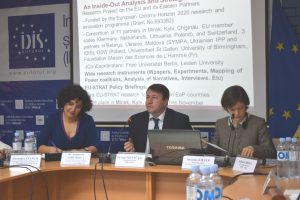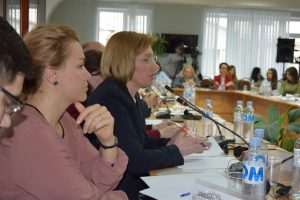EU-STRAT’s first policy briefing in Moldova was held on 22 November 2016 and was organized by the local partner, IDIS, in Chisinau.
The briefing was broadly attended by local media and journalists, academics, think tank representatives and policy experts from a variety of organizations, as well as representatives of the EU. IDIS Chairman Igor Munteanu presented the objectives and structure of EU-STRAT and discussed the relevance of the main concepts and ideas of the project, such as limited access orders and political economy approaches, for analysing developments in Moldova. Munteanu stressed that the EU’s projected normative power would also have an impact on the EU’s success or failure in its Eastern neighborhood.
Insights on whether the EU communicates as a soft, normative or transformative power were presented by Antoaneta Dimitrova, EU-STRAT team member and co-coordinator (Leiden University). Dimitrova presented the results of a multiple team quantitative analysis of EU official communications as presented on the EU delegations websites in Belarus, Moldova and Ukraine. She stressed that there has been quite some differentiation in official communications towards Belarus, Moldova and Ukraine: the EU emphatically addressed Belarus as a normative power and Ukraine and Moldova with an emphasis on reforms, i.e. as a transformative power.

Suzanne Kiefer, Senior Specialist of the EU’s East StratCom Task Force highlighted the changing character of EU communications and the shift from impersonal to personal stories and narratives, from official to social media sites. She presented the example of the new type campaign, ‘Red card to corruption’, involving Moldovan football players and sport personalities, able to reach a broader audience domestically. In the same vein, the presentation by Ruxandra Stanciu, Press and Information Officer of the EU Delegation, discussed the new trend in EU communications. Stanciu stressed that a major goal of the EU Delegation in Moldova, exemplified in the recent creation of her post as a press officer, is to change the technocratic and clumsy language to a direct and engaging discourse towards the citizens, based on clear benefits and mutual respect. She noted that the polarization of media outlets and their ownership has created imbalances in the ability of different external actors – especially the EU- to send their messages and of citizens to receive them. She suggested the EU may persuade its audiences through success stories and honest reporting, but the media channels through which these messages arrive are few.
Three speakers were asked to comment on what citizens want to know about EU and on how they assess the effectiveness or resonance of the policy information from EU Delegation. Can the EU overcome its tendency to address elites and experts and define a narrative to appeal to citizens more directly? Journalists’ views were presented by panel members Vasile Botnaru, Country Director of the Radio Free Europe/Radio Liberty and Ludmila Barba, Senior Editor of the TV Programme ‘European Vector’ at the National Public TV Teleradio Moldova. Vasile Botnaru warned the audience that journalists themselves need to be active and not take uncritically on board the ‘free lunch’ information provided by various outlets without digging deeper themselves. He was critical of the changes in the communication discourse of the EU in Moldova, saying that it is as if the EU ‘sells a car, being less interested to interact with the real feelings of the population’. Barba suggested the EU’s own communications and actions are not internally coherent, noting the mixed reactions of different EU actors towards the presidential elections in Moldova and relations with the President elect.

Last but not least, the previous government’s strategy for EU communication and the most serious challenges were discussed by Iulian Groza, Director of IPRE, Former Deputy Minister of the MFA. Groza argued that Moldovan audience needs to receive less geopolitical messages, and more specific points related to the real agenda of the population. The panel discussion turned into a heated exchange of views on what not only the European Union, but also politicians and journalists in Moldova may want to communicate about Moldova’s chosen path towards closer relations with the EU and the implementation of the DCFTA.
The event was attended by 46 participants, 6 TV teams, providing on-line streaming TV live from the event. MFA officials, diplomats from the EU delegation and other embassies attended as well. The policy briefing attracted a lot of attention in the local mass media.Opening a lively, rich and critical debate, with a discussion of some of the real challenges of communicating the EU actions by a variety of participants was the event’s greatest contribution, first and hopefully, not the last EU-STRAT contribution to public debates in Moldova.
